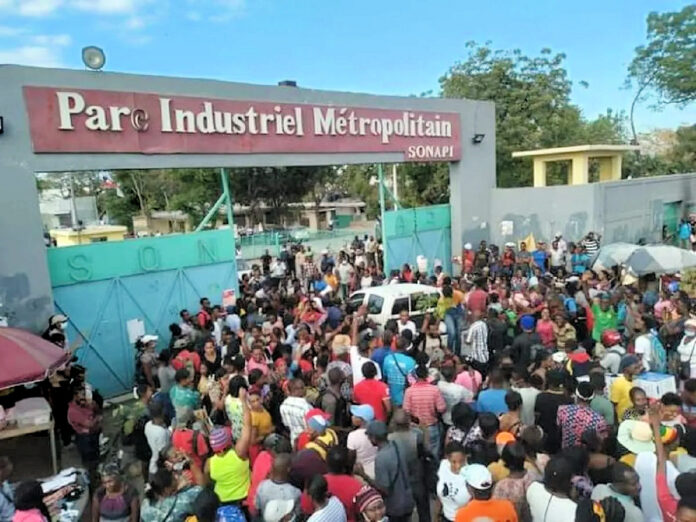
PORT-AU-PRINCE – Factory workers in Haiti walked off the job and demonstrated in front of Port-au-Prince’s principal industrial park on Feb. 9 and 10 to call for higher wages. It was the second major labor strike in the span of three weeks.
“You will see the number of workers who mobilized, because we are not able to live with that minimum wage,” said Didier Dominique, a labor rights activist and educator who helped organize the strike with Batay Ouvriye, a grassroots labor organization.
Video and photos posted to Twitter on Wednesday showed people spilling out onto the street in front of the Metropolitan Industrial Park (SONAPI), which is located next to the the Port-au-Prince airport. Some danced to music and held tree branches, a popular symbol of uprooting, or change.
Coordinated demonstrations also took place at Haiti’s two northern assembly industry parks in Caracol and Ouanaminthe.
Dominique, in a phone interview, estimated that thousands walked off their job or took part in the Port-au-Prince protests that morning to protest the minimum wage, about $5 per day in U.S. currency. The government, he said, should raise the wage to 1,500 gourdes, or close to $15, per day, to help keep up with inflation.
“Many of our comrades in the factories, they don’t eat at midday so they can have something to [bring] home,” said Dominique, who splits time between Port-au-Prince and the northeast. “The state, or the PHTK government, never addressed our minimum salary.”
Workers in Port-au-Prince plan to strike again on Feb. 10, said Dominique.
This latest strike in the capital followed closely on the heels of similar demonstrations by workers at the Caracol Industrial Park, in the Northeastern Department, in late January. Workers in the northeast demanded that their employer, South Korean textile firm S&H Global S.A., raise wages from about US$5 to $15 per day, The Haitian Times reported on Jan. 31.
The company announced on Jan. 25 it would raise wages to $6 per day, which workers said was not enough.
Both Caracol and the Metropolitan Industrial Park are overseen by the National Society of Industrial Parks, or SONAPI, a private agency created by the Haitian government. The Metropolitan Industrial Park contains at least 16 manufacturers, including garment and electronics makers, employing at least 12,000 people.
SONAPI did not return an email request for comment.
Trade unions representing textile workers have been making demands for wage increases since at least mid-January. A coalition of nine trade unions sent a letter to interim Prime Minister Ariel Henry on Jan. 17. The letter noted rising inflation and demanded an increase to the minimum wage, also to about $15 per day, according to a report by the Solidarity Center, an international worker rights organization with ties to the American AFL-CIO labor federation.
Workers at the SONAPI complex in the Port-au-Prince area also staged a smaller protest on Jan. 18, for wage increases.
An earlier version of this article is published in the Haitian Times on Feb. 10










